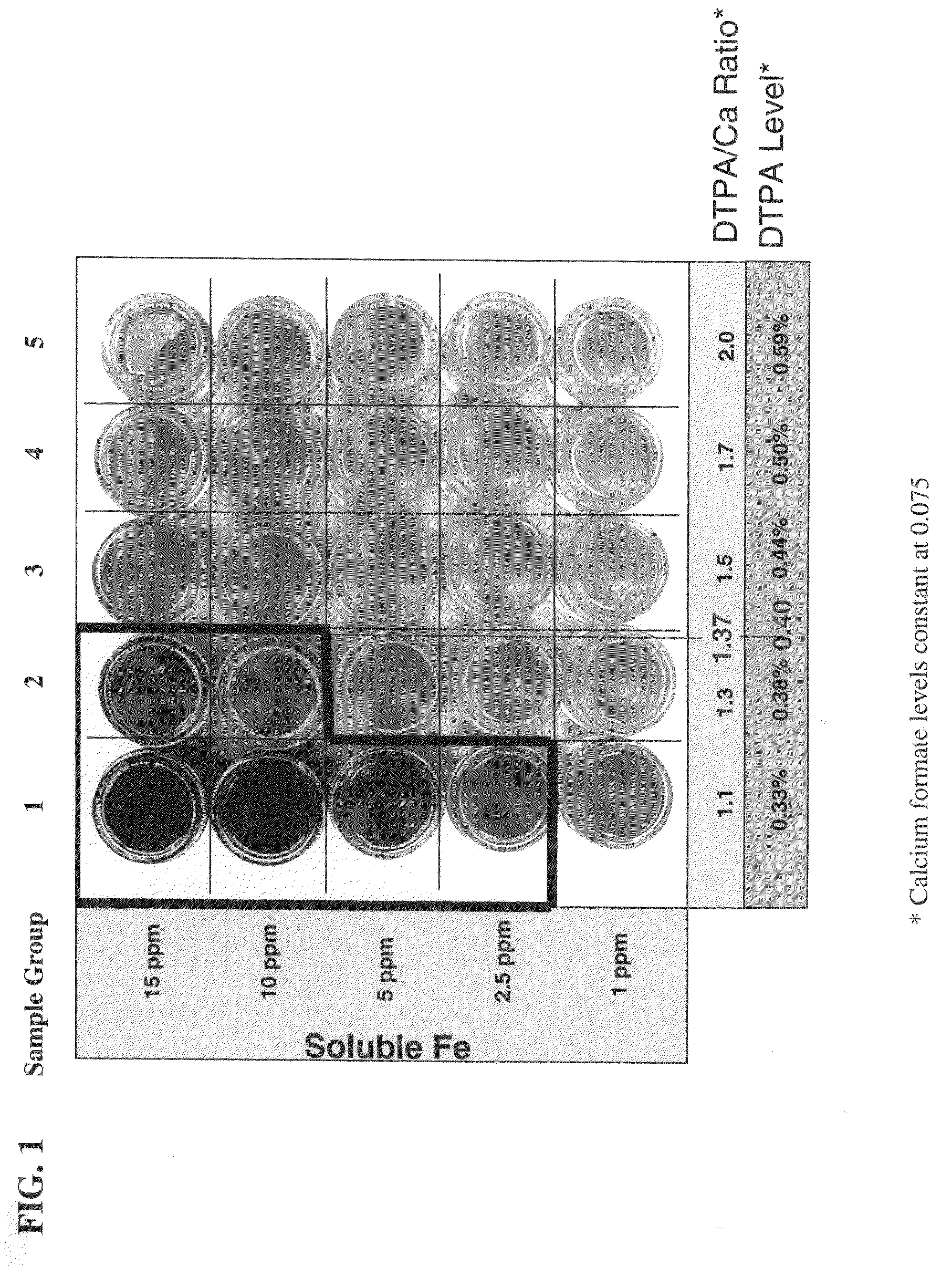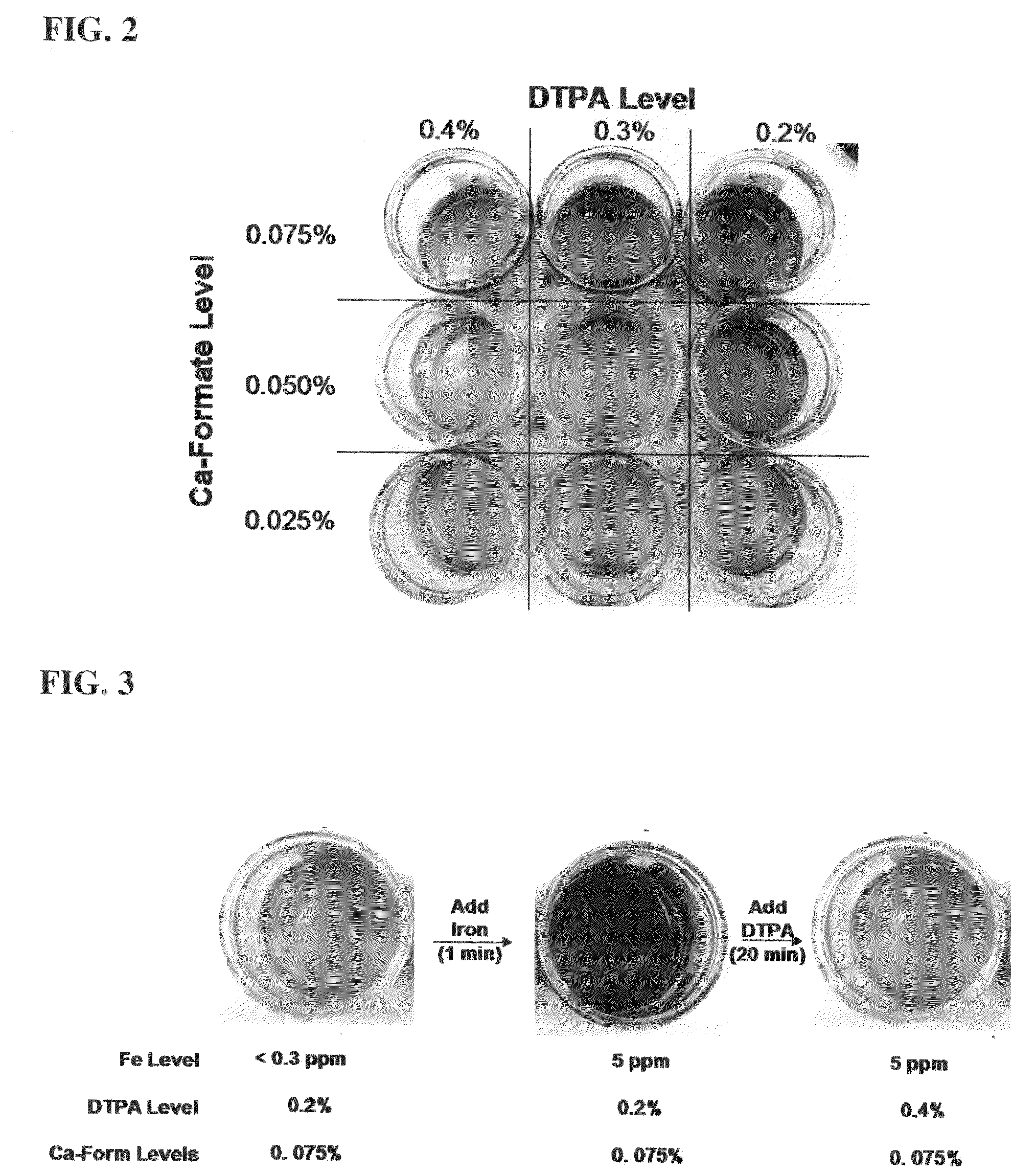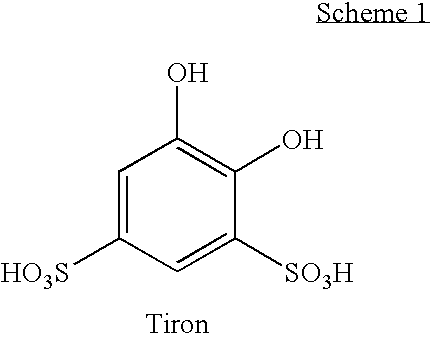Detergents having acceptable color
a technology of detergent composition and acceptable color, which is applied in the field of detergent composition, can solve the problems of reddish hue of detergent composition, additional cost required to remove red color from detergent, and not traditionally used, and achieve the effect of reducing the intensity of red color
- Summary
- Abstract
- Description
- Claims
- Application Information
AI Technical Summary
Benefits of technology
Problems solved by technology
Method used
Image
Examples
example 1
[0080]In this Example, the molar ratio of DTPA to calcium ion at which a good balance between tiron color control and enzyme stability is determined. The stability of NATALASE® amylase enzyme at various concentrations of calcium ion and various concentrations of DTPA is determined.
[0081]To a sample formulation of commercially available HDL liquid detergent is added 5 ppm of Fe3+ and 1% (wt) of tiron. Varying concentrations of DTPA (pentasodium salt) and calcium ion (in the form of calcium formate) are added to the detergent mixture to form a 3×3 matrix of nine samples and the solution stirred with mechanical stirring. The color and enzyme stability is measured. Enzyme stability is determined at 32° C. over 21 days using the Infinity™ reagent utilizing ethylidene-pNP-G7 as substrate (commercially available from Thermo Scientific, Waltham, Mass.). The stability of the enzyme under various experimental conditions is presented in Table 1. As can be seen in Table 1, at enzyme stability i...
example 2
[0082]In this example, the color reversibility of iron / tiron complexes is demonstrated. Red color formation is demonstrated by the addition of excess iron to a detergent composition comprising tiron, calcium formate, and DTPA and the red color is then eliminated / reversed by addition of DTPA.
[0083]To a sample formula of a commercial HDL liquid detergent containing calcium is added 1% (wt) of tiron, sufficient Fe3+ to form red coloration, and insufficient levels iron binding chelant (e.g., DTPA) to mitigate color formation by the HDL sample. For example, 1% tiron, 10 ppm Fe3+, and low levels of DTPA are added to an HDL formulation to achieve a DTPA:Calcium molar ration below 1.0. The resulting red HDL sample is them titrated with a DTPA solution to until the DTPA:Calcium molar ration exceeds at least 1.05, and the mixture is mechanically stirred for at least 15 minutes. The resulting HDL sample color turns from red back to yellow indicating reversal of the tiron / iron chelate formation...
example 3
[0084]In this Example, liquid detergent compositions are formed, an iron standard is added and the spectroscopic characteristics of the resulting solution are measured.
[0085]The detergent composition was made using the following protocol. To a 7.6 L heavy duty plastic bucket is added 2,122 g of a blend of alkyl ethoxy sulfate (“AES”) paste (technical grade, ˜50% wt / wt). The following materials are added in order to the mixture while stirring with an overhead stirrer (IKA model DZM.N RW20) to ensure adequate mixing: 660 g of a branched alkyl sulfate paste (˜50% wt / wt); 100 g of a neat amine alcohol; 50 g diethylene glycol; 160 g fluorescent brightener; 24.5 g of a DTPA solution (VERSENEX® 80, commercially available from the Dow Chemical Company, Midland, Mich.) was added to ensure dissolution of the calcium formate; 144 g of a LAS paste (97% active wt / wt); 300 g citric acid (50% active); 12.5 g calcium formate (10% wt / wt active); 100 g C12-C18 fatty acid; 400 g borax premix; 319 g ti...
PUM
 Login to View More
Login to View More Abstract
Description
Claims
Application Information
 Login to View More
Login to View More - R&D
- Intellectual Property
- Life Sciences
- Materials
- Tech Scout
- Unparalleled Data Quality
- Higher Quality Content
- 60% Fewer Hallucinations
Browse by: Latest US Patents, China's latest patents, Technical Efficacy Thesaurus, Application Domain, Technology Topic, Popular Technical Reports.
© 2025 PatSnap. All rights reserved.Legal|Privacy policy|Modern Slavery Act Transparency Statement|Sitemap|About US| Contact US: help@patsnap.com



